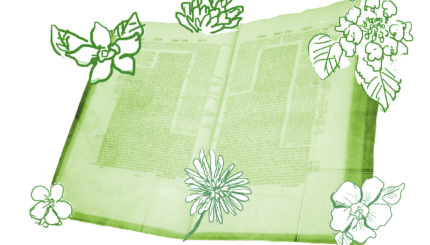Commentary on Parashat Sh'lach, Numbers 13:1 - 15:41
Moses sends 12 spies to the Land of Israel to report on the inhabitants and the country. Despite the positive report of Joshua and Caleb, the people are frightened. (Numbers 13:1–14:10) God threatens to wipe out the Children of Israel but relents when Moses intercedes on their behalf. To punish the people, God announces that all those who left Egypt would not enter the Land of Israel except for Joshua and Caleb. (Numbers 14:11–45) Moses instructs the Israelites regarding setting aside challah, the observance of the Sabbath, how to treat strangers, and the laws of tzitzit (fringes). (Numbers 15:1–41)
Focal Point
Adonai [God] spoke to Moses, saying, “Send men to scout the land of Canaan, which I am giving to the Israelite people; send one man from each of their ancestral tribes, each one a chieftain among them.” So Moses, by Adonai’s command, sent them out from the wilderness of Paran, all the men being leaders of the Israelites. (Numbers 13:1–3)
At the end of 4- days, they returned from scouting the land.… This is what they told him [Moses]:
“We came to the land you sent us to; it does indeed flow with milk and honey, and this is its fruit. However, the people who inhabit the country are powerful, and the cities are fortified and very large….”
Caleb hushed the people before Moses and said, “Let us by all means go up, and we shall gain possession of it, for we shall surely overcome it.” But the men who had gone up with him said, “We cannot attack that people, for it is stronger than we.” Thus they spread calumnies among the Israelites about the land they had scouted, saying, “The country that we traversed and scouted is one that devours its settlers. All the people that we saw in it are men of great size; we saw the N’philim there — the Anakites are part of the N’philim — and we looked like grasshoppers to ourselves, and so we must have looked to them.” (Numbers 13:25–33)
Your Guide
What is the purpose of the scouts’ mission in the Torah portion? How does it differ from that of the scouts in the Haftarah portion (Joshua 2:1–24)?
What is the nature of the scouts’ transgression according to the Torah portion? Does their punishment fit the crime?
Who issues the command for the scouts to enter the land? Why does God allow and even command this action, given the results that ensue?
Why is the commandment to make fringes on the corners of one’s garment placed at the end of this Torah portion after the incident involving the scouts? Is there any connection between the two? (Hint: The word tzitzit is connected to l’hatziz, “to glimpse or peek.”)
By the Way…
“The land of Canaan, which I am giving to the Israelite people” [Numbers 13:2]. The Torah added another condition to make the spy mission an acceptable one: It is that those who do the spying be aware it was God who was going to give them this land. The Israelites would not be able to conquer even a single town in that land by themselves. The only way they would be able to do so would be “if I give it to them” [Numbers 13:2]. (Or HaChayim)
“Adonai spoke to Moses, saying, Sh’lach-l’kha, ‘Send forth.'” L’kha here denotes according to your [Moses’] understanding. As for Me, I do not command you to do so; if you so desire, then send them. (Rashi on Numbers 13:1)
The purpose of sending the spies was so that future generations would not claim: “The previous inhabitants of Canaan were weak, and the Israelites conquered the country by natural means.” (Tzvi Yisrael in Torah Gems, p. 59)
One can understand their statement “We looked like grasshoppers to ourselves” for that was the way they really saw themselves. However, what right did they have to say “and so we must have looked to them?” What difference should it make how we [the scouts] appeared to them? (Rabbi Menahem Mendl of Kotzk on Numbers 13:33 in Torah Gems, p. 67)
Did the spies lie? Did they make up what they told the people? Obviously not; they told the people exactly what they had seen. What, then, was their sin? The answer is that not everything that is not a lie is the truth.… The truth is not necessarily as things appear but stems from the depths of the heart, from the sources of one’s faith. Truth and faith go hand in hand, and a person does not acquire truth easily and by a superficial glance. What is required is hard work and effort, wisdom and understanding. The spies did not work at finding the truth in God’s word. They did not understand the divine secret. They preferred their limited and deceptive vision to God’s promise, which is the absolute truth–and that was their great sin. (Rabbi Menahem Mendl of Kotzk in Torah Gems, p. 64)
“All thine enemies have opened their mouths against thee” [Lamentations 2:16]. Rabbah said in Rabbi Johanan’s name: Why [in Lamentations 3:46–51 and 4:16–17, which are written in the form of alphabetical acrostics] did he place the [verse beginning with the letter] peh before the [verse beginning with the letter] ayin? Because of the spies who spoke with their mouths [peh means mouth] what they had not seen with their eyes [ayin means eye]. (Talmud, Sanhedrin 104b)
Blessed are You, Eternal One, who helps the blind to see. (from the Morning Blessings)
Your Guide
Based on Or HaChayim, Rashi on Numbers 13:1, and Tzvi Yisrael in Torah Gems, do you think that the decision to send the scouts was a good one?
How could it have had a better outcome? How accurately did the scouts assess their potential foes? Compare the opinions of Rabbi Menahem Mendl of Kotzk with that of Sanhedrin 104b. How important was it that the scouts’ report be objective?
According to Rabbi Menahem Mendl of Kotzk, what is the connection between faith and perception?
Commentary
This week’s Torah portion provides both a diagnosis and a prescription. The diagnosis: The Israelites suffer from imperfect vision. When their leaders go to scout the land of Canaan, what they see is distorted in many ways. They see the enemy as if through a magnifying glass: Everything the enemy does or has is larger than life. And they see themselves as if through the wrong end of a pair of binoculars: as diminished and inconsequential as insects are.
But the greatest failure of the Israelite scouts lies not in their inability to see the land accurately but rather in their inability to see beyond the “reality” that confronts them. Their world, like ours, gives them many reasons to fear, to despair, and to want to return to the restrictive but familiar routine life they led in Mitzrayim (Egypt). Just as insects are drawn to a flame that will burn them, the scouts’ glance is constantly drawn outward toward those things that daunt them the most.
The scouts fail to look beyond the surface reality of the “what is” that scares them to the “what could be” that might inspire them. They fail to look with the inner eyes of faith and are instead led astray by eyes that see only the worst. They forget that God, the source of belief and hope, is at least as real as any giant and that miracles happen all the time.
And so the prescription: To correct superficial vision, look at the tzitzit, a symbol of faith and steadfastness, l’maan tiz’k’ru, “so that you remember.” Remember that the present is pregnant with possibility even if we can’t always see it with our ordinary eyes. Remember that we are not alone and never powerless.
As we confront the giants in our personal lives and the ones that plague the world, may we train ourselves to see with eyes strengthened by faith, and may that vision inspire us to walk in paths of righteousness so that we help to create a brighter tomorrow.
Reprinted with permission from the Union for Reform Judaism.
Torah
Pronunced: TORE-uh, Origin: Hebrew, the Five Books of Moses.
tzitzit
Pronounced: TZEET-tzeet, or TZIT-siss, Origin: Hebrew, fringes tied to the corners of a prayer shawl.



